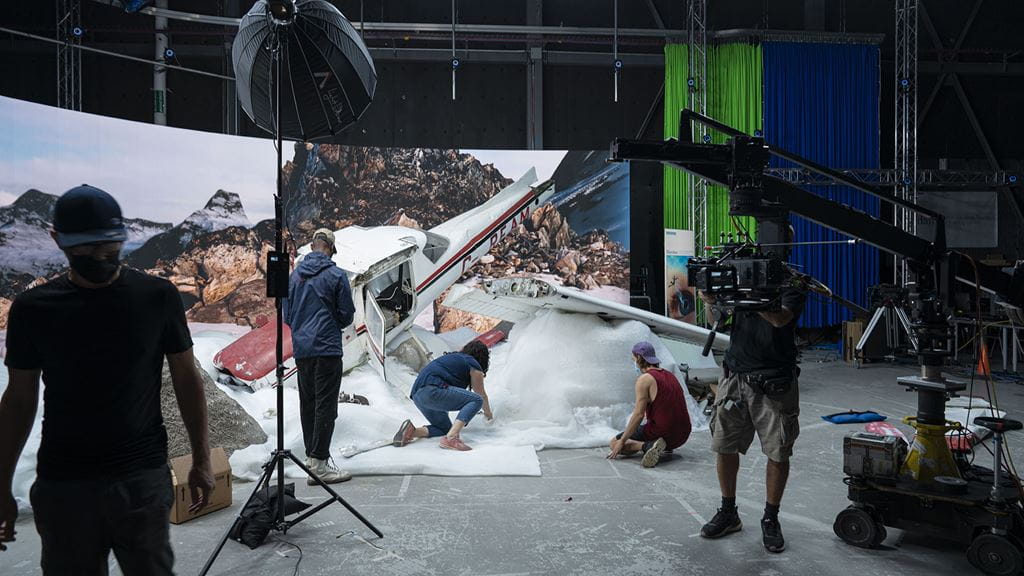
Readying screen industry creators and storytellers with future-ready skills
 by Debbie Silva – Mar 25, 2024
by Debbie Silva – Mar 25, 2024 .jpg?h=225&w=400&rev=bf52422e2b914b1c820c0e587616cd44&hash=0FF5AD6DC46853CFA56E3AC7E3F1C20C) For the industries of film, television, and interactive digital media, a lot can happen within a few years.
For the industries of film, television, and interactive digital media, a lot can happen within a few years.
In the midst of a socially and economically disruptive time, technology has inevitably changed the way we live. Artificial intelligence (AI) and extended reality technologies such as augmented reality (AR) and virtual reality (VR) are becoming a bigger part of our everyday lives. With the rising use of these technologies, industry partners are looking to leaders in the innovation space to help them navigate the wave of change.
Fortunately, this is a sweet spot for the Screen Industries Research and Training Centre, an integral part of Generator at Sheridan. Change and reinvention continue to provide the research centre with more opportunities to leverage what it does best — supporting the industries of film, television and interactive digital media through innovative approaches in research and training.
 With the increasing use of extended reality technologies in film/TV, media and gaming, SIRT has been a go-to collaborative resource for small and medium-sized companies looking to reach new heights in a competitive industry. It’s played a pivotal role with collaborators in revolutionizing these technologies, including Dynamic Digital Humans (DDH) technology — virtual humans created for mixed reality to mimic human characteristics. DDH technology is increasingly being used in film and television, but there are opportunities for other applications of the technology, as well. For example, in teaching and training, or as companions for isolated seniors.
With the increasing use of extended reality technologies in film/TV, media and gaming, SIRT has been a go-to collaborative resource for small and medium-sized companies looking to reach new heights in a competitive industry. It’s played a pivotal role with collaborators in revolutionizing these technologies, including Dynamic Digital Humans (DDH) technology — virtual humans created for mixed reality to mimic human characteristics. DDH technology is increasingly being used in film and television, but there are opportunities for other applications of the technology, as well. For example, in teaching and training, or as companions for isolated seniors.
Two notable efforts behind the development of this groundbreaking space include SIRT’s collaboration with Toronto-based Cream Productions on “Be Curious”, a virtual reality campaign that used precise DDH and featured a human avatar of Lord of the Rings actor Dominic Monaghan (pictured, above). Elsewhere, Survivorman VR, a game tailored for PSVR and Oculus Quest platforms that provided users with immersive experiences that simulate real-world survival scenarios, guided by renowned survival expert Les Stroud.
“The demand from companies looking for more visually innovative and extraordinary ways of telling their stories continues to grow,” says Myles Bartlett, SIRT’s Interim Director. “The reliance on extended, augmented and virtual reality tools, for example, has opened new doors in how we approach and deliver ideas in the screen industries. We’re experts in that field and have continued to share our knowledge, skillset and leading-edge tech with our partners, helping them become future-ready and relevant in a constantly changing industry of technology.”
In addition to the innovation support provided by students, faculty, staff and community and industry partners, vital funding has helped SIRT to continue its ongoing work in research and development. Over the last few years, the Centre has received significant support to further its innovation with industry partners, including a $2 million Tri-Agency Applied Research and Technology Partnership grant to work collaboratively with one additional Ontario college and two Quebec Cegeps to support research on virtual humans; a five-year $1.75 million investment from the Tri-Agency to continue their standing as a Technology Access Centre, a designation given to specialized centres of expertise that offer timely innovation support to organizations from the private, public, or not-for-profit sectors; and Contribution to Organization (CTO) grants from the National Research Council’s Industrial Research Assistance Program that helps SIRT provide continued research and development expertise to small and medium-sized businesses in the industry, ultimately stimulating economic growth through innovation.
Currently, SIRT is wrapping up its CTO projects funded in 2022/23, a cross-section of projects that lean into research and development based in AI and other immersive technology. These recent examples provide a real-time glimpse into how SIRT continues to help partners navigate new approaches to technology in the screen and media industries, equipping them with innovative ways of remaining relevant and successful in a competitive industry.
Enhancing the travel experience for the Deaf community
Deaf AI, a company that transitions human-based services to AI-based services in Sign language, has worked with SIRT to address accessibility barriers and limits for travellers who are deaf by using real-time, AI-powered translation tools that converts text strings into American Sign Language and Langue des signes du Québec.
Virtual reality training
SIRT partnered with UNLTD Therapeutics (a VR/AR company that uses immersive technology to reduce societal impacts of stress and anxiety in children) on the development of their virtual reality training platform. The project explored performance capture (PCAP) data and technologies including body animation, facial animation, hand animation and voice capture to effectively capture an actor’s performance for use in a virtual reality training experience.
Digital Human Creation and Functionality
SIRT worked with Boom Gaming on a project that explored creating, animating and communicating with life-like digital characters. The project explored the ability to leverage Epic Game’s Metahuman workflow which allowed for human characters to be customized and used inside Unreal Engine, a real-time 3D creation tool.
Applied Research with Dark Slope
SIRT’s work with Dark Slope Studios focused on evaluating and testing workflows for in-camera visual effects using Unreal Engine. The project involved testing and evaluating systems that combine real filming with computer-generated environments to create realistic scenes in camera using LED walls. The effectiveness for on-set operation of virtual production tools within Unreal Engine was an additional piece of the work.
To find out more about how you can partner with SIRT please email sirt@sheridancollege.ca.
Pictured top right: Cream Productions DDH avatar in the development of Survivorman VR: The Descent.
Pictured bottom left: A Dynamic Digital Human (DDH) created in the likeness of Lord of the Rings actor Dominic Monaghan.
Popular stories
- Sheridan to offer flexible online programs geared to busy working professionals
- New applied computing programs address urgent shortage of security professionals
- Sheridan welcomes two Indigenous Engagement and Education Associate Vice Presidents
- Sheridan's new brand reflects its commitment to unlocking opportunities
Media Contact
Meagan Kashty
Manager, Communications and Public Relations




